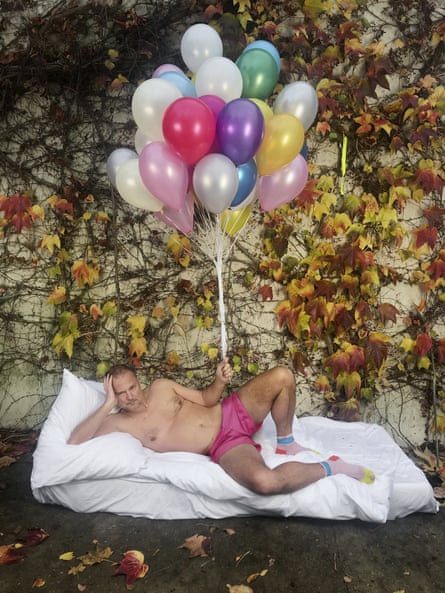“I need to live” is spelt out in neon letters in the entrance of the Juergen Teller exhibition at Grand Palais Éphémère in Paris. A title that goes well with the posters that can be seen all around the city: a self-portrait of the photographer reclining languidly in silky pink shorts while holding a bunch of candy-coloured balloons. In the temporary hall, put in place while the gallery is restored, the work of the photographer known for his gritty, humorous and spontaneous style – the British actor Riz Ahmed claimed Teller once shot him in “20 seconds, two clicks” as he sat on an Ikea folding chair under a tree – is a refreshing antidote to the glamorous side of the city outside.
Opened last weekend, the show is the most important yet dedicated to Teller’s work: more than 1,000 pieces, including photographs, films and installations, cover 10,000 sq metres. Some of the pictures on display have become more famous than the man behind them: Victoria Beckham’s legs popping out of a Marc Jacobs bag, a triptych of Vivienne Westwood naked, an equally naked Charlotte Rampling in the middle of the Louvre, Iggy Pop hugging a tree, Björk with her son.

Teller’s style has become instantly recognisable: shot in streets, outside studios or clubs, using a harsh flashlight, they are unglamorous, unfiltered, diametrically opposed to slick studio fashion photography. Teller is at the forefront of contemporary realism, endlessly replicated online and evocative of the low-fi aesthetic of fashion brands such as Demna’s Balenciaga – the controversial designer’s portrait is included in the show.
An alternative gaze on fashion and celebrity photography, Teller’s work seems to gratify a craving for authenticity. German-born and based in London, where he moved in the 1990s, Teller distanced himself from the glossy style of photographers working in fashion at the time, such as Craig McDean, Nick Knight or Steven Meisel, introducing documentary-inspired style that was compared to the work of William Eggleston, Nan Goldin and Diane Arbus.
Teller is now one of the best known photographers in the world, thanks to his campaigns for Marc Jacobs, Celine and Yves Saint Laurent, among others, with more than 50 books to his credit and solo shows around the world.

What is striking about Teller’s approach, as this exhibition highlights, is a blurring of distinctions between genres, high and low, private and public, personal and commercial work.
“Frankness is the best way to describe him. He is interested to see what is behind the facade,” says Thomas Lenthal, the founder and creative director of System magazine, who has collaborated with Teller for nearly 30 years. “He wants to document his own existence, with recurring characters coming back into his life. His photographs are his life and vice versa; he wants to photograph things that interest him and that’s what keeps him and his work alive.”
The show is conceived like a journey through the essential events of his life – starting, notably, with the suicide of his father, then his own coming of age; later events include his 2021 marriage to Dovile Drizyte, also his creative partner and co-curator of the show. It intersperses personal life, plants, organic elements, books, baby photos, but also personalities such as the philosopher Slavoj Žižek, the film-maker and artist Agnès Varda with her cat, fashion editor Edward Enninful in a public swimming pool, and Yves Saint Laurent up close.
“This is never about the status of the person; he shoots very democratically – objects, people, nature are all placed on the same level,” says co-curator Thomas Weski, joking that Teller neither knows the celebrities he shoots nor the fashion world itself. “Juergen finds beauty in the most mundane space or moment. He is very good with people and works in a spirit of collaboration … He steps in front of the camera, allows himself, too, to show fragility.”
after newsletter promotion

Vulnerability is central to the show, and is addressed with humour. In 2021, Teller was criticised online for the perceived amateurishness of a shoot he did for W magazine of 28 Hollywood stars, including Michelle Pfeiffer, George Clooney and Riz Ahmed. For those who celebrate Teller’s knowingly unglossy work, the critics missed the point. The show features these photos as well as the internet comments on them framed like artworks.
Behind Juergen’s lens, reality becomes theatre and glitz becomes human – but his capturing of vulnerability never feels voyeuristic. Teller refuses the title of fashion or art photographer, insisting in interviews that he is just a photographer who produces work. As Charles Baudelaire said: “Créer un poncif, c’est le génie”(“Creating a cliche, that’s genius”). Teller’s work might look simple, but therein lies its brilliance.